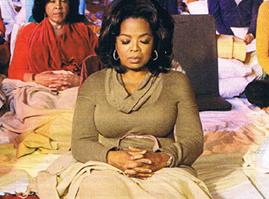Sometimes people like to horrify me by saying they don’t like poetry. When I respond, I try to school my facial expression into the accepting smile of Oprah on a good day.

Hey, kids, it’s all good. I accept you as you are.
Mostly, though, I’m baffled.
Poetry defines a vast stretch of the written word. Sometimes it’s meant to rhyme, sometimes it’s meant to be spoken, sometimes it tackles serious issues, and sometimes it delves into nothing more important than the lack of passes at girls who wear glasses.
Poetry is everywhere. It’s the heart of the song that you say is the heart of you. It’s the lyrical meanderings of a hobbit named Bilbo, and the stark call to arms of a soap maker named Tyler. It is the title of a painting that moves you to tears and the inscription on your wedding ring. It is folded gently into our holiest of books and our most precious of lullabies.
At this point in my thoughts, I start to notice that my facial expression has fallen from loving peacefulness and morphed into something that looks more like the start of a pretty decent meme.

- WHAT are you TALKING about??!
How, in the face of all of that substance and variety, could you say that you don’t like poetry?
It’s like saying you don’t like eating, because once someone made you eat something you didn’t like. It’s like saying you don’t like playing indoor games, because you have a particular problem with Monopoly. It’s like saying you don’t like clouds, because — what have they done for you lately?
Not all poetry will be presented in its best light. Not all poetry is worth the fame it has garnered. Not all poetry will touch your heart, or impress you.
But those are tiny blemishes on an art form that ties all art together.
Still, I try to make peace with it. Not everybody likes everything. Someone like me, who rarely participates in popular interests, should be more than normally gracious about that truth.

In the center of my stillness, there is balance. In the center of my balance, there is a pink plastic flamingo standing on one leg. He loves everyone. He is in completely control of the world, because he is in control of nothing but himself.
Opinions aside, though, there are a lot of reasons why poetry matters.
It creates passionate readers, connected humans, fearless writers, and effective communicators via the teaching of incredibly important skills. Each of these could be full courses in their own right, and there are many more wonders to poetry, but for now I’ll just summarize the ones I most value.
1. How to control empty space and pauses.
Fine art makes quite a fuss over the effective use of white space, and it’s no less important in writing. Not everyone reads the same. It’s the obligation of the writer to show the reader when to pause, hesitate, stop, breathe, or process. Whether you choose to guide this by word choice, punctuation, or emphasis, the reading and writing of poetry will help you hone that skill.
2. How to be vulnerable.
In most poetry, you don’t have the luxury of paragraphs of text to build to an implication. You have to delve behind the facade of your topic and be bluntly truthful with your vulnerability. It shines through and people respond. It can be uncomfortable, but that’s a good thing. Effective communication, writing, or reading should make you shudder, giggle, cringe, cry, zone out, or scream.
3. How to be flexible and fearless.
Yes, there’s a right way to use a comma, but it’s important to remember that — academically speaking– some of the most touching pieces of literature of all time would barely receive a passing grade. Communicating hinges on flexibility. If you need a phrase that doesn’t exist, coin one. If you need an analogy outside the bounds of normal thought, stretch for it. If you want a sentence littered with punctuation, write one– but if it could be more effective without punctuation, forsake it. Flexible writing establishes voice and attracts a wider readership, and nothing teaches that better than the freedom of poetry.
4. How to master your shape.
Form matters. In this age of blogs and e-books, form matters more than ever. Whether a new paragraph starts on the first sentence, or the fifth, matters. Whether your title gives away the story or not matters. Every single word matters. Poetry teaches control in a way no other writing will.
5. How to lead into your boom-shish.
You know when a comedian tells a joke and the drummer makes that boom-shish sound? Writing should do that, too. Poetry teaches how to lead into that boom-shish, beginning with the title and trailing all the way down to the final word.
***
Poetry is a pink, one-legged flamingo balancing in the center of a wobbly world. It’s all about absurdity and zen, the simple and the exotic. It is about control– of the writer and the reader– and it is about total, absolute freedom of thought and feeling.
Do you have to like it? Of course not.
But does it matter?
Yes.
_______________________________________________________________________
What has poetry taught you? Are you one of those non-poetry people? It’s alright to admit it, I’ll love you anyway.
I’m not usually so Oprah-centric, since I’ve only ever seen a handful of her shows– but I stumbled across a picture of her today that made me think we’re more alike that I knew:

Rawr! Says the Oprahsaurus Rex!


